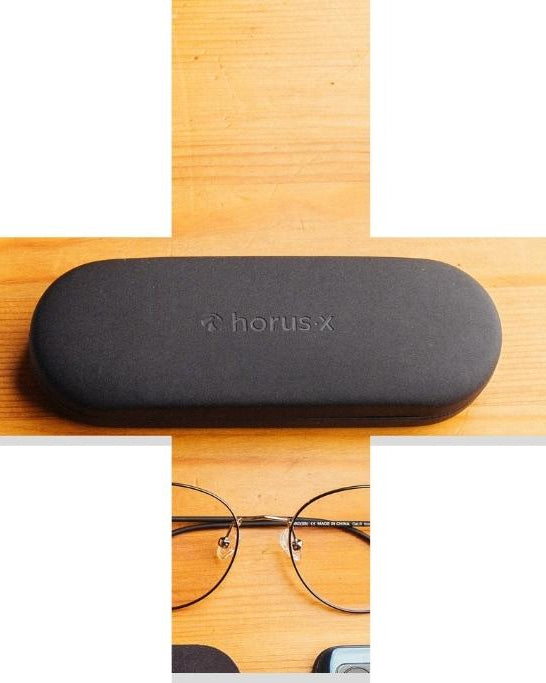Are you having cataract surgery soon and wondering if you should wear glasses after the procedure?
In fact, in the days or weeks following this surgical procedure (which consists of replacing the cloudy lens with an intraocular implant), you may be required to wear glasses.
But why? Which ones? And for how long? We answer all your questions!
What is cataract surgery?

It's a joint operation: 826,000 interventions in France in 2016, for 574,000 patients. Yes, that's a lot of people!
Cataracts are characterized by a progressive clouding of the lens which can progress to the point of significantly impacting vision and ocular comfort.
Surgery is considered when glasses are no longer sufficient: basically, it aims to remove the clouded lens and replace it with an implant. This implant will improve the clarity of vision, but can also correct disorders such as myopia.
The operation can be covered by Social Security, the reimbursement basis being applied depending on the type of implant.
Why do you need glasses after cataract surgery?

This type of surgery is performed when the cataract has progressed to the point where glasses are no longer sufficient. The procedure is quite simple: once the cloudy cataract has been removed, it is replaced with an implant that can also improve distance vision, or even near vision, depending on the implant chosen.
Wearing glasses after surgery is not systematic, but recommended in many situations:

- 😵💫 Weakened eyes: As with any eye surgery, you will likely be advised to wear protective glasses to take care of your eye during the healing phase. (We also recommend wearing glasses after refractive surgery)
- ☀️ In case of photosensitivity (increased sensitivity to light): this is a complication that is very common after cataract surgery.
- 🤓 To correct vision: Replacing the natural lens with an artificial lens can also eliminate the need for prescription glasses. However, some patients will continue to wear glasses after surgery because their vision problems will not have been completely corrected.
- 🏥 If both eyes are operated on and you need to adjust between the two operations: This type of surgery involves operating on one eye at a time. Your old glasses will no longer fit, and you will need transitional corrective lenses.
Basically, you may need to wear glasses after this type of surgery for two reasons: the fragility of the eye postoperatively and the new correction after surgery.
💡 Please note: If you want to kill two birds with one stone, namely treat your cataract and regain clear vision, it all depends on your correction. A monofocal implant (the most commonly used) can also correct myopia or hyperopia (but not near vision problems). If you have astigmatism or presbyopia, your practitioner may suggest a multifocal or toric implant. You will have the opportunity to discuss this with him (or her!) during a pre-operative consultation, to assess the possible risks and contraindications.
What type of glasses should I choose after cataract surgery?

🤿 Post-operative protective glasses:
As mentioned above, after surgery, you may be prescribed a pair of protective glasses. They provide coverage, but are not always comfortable, and can be replaced after a few days of healing.
🕶️ Sunglasses with UV filter
Wearing quality sunglasses is essential to protect your eyes from the sun or bright light after surgery. Always remember to wear them outdoors to ensure proper healing.
To choose your sunglasses wisely, pay attention to the category (we recommend category 3, the most versatile), the presence of the CE standard and that the sun lenses effectively filter UV rays. You can also opt for polarized lenses for greater comfort, particularly against glare.
👓 Blue light filter glasses

We call them resting glasses, but it's the blue light filter that really interests us here. Avoiding eye strain is even more essential after surgery. So invest in quality blue light blocking glasses that you can keep and use for years to come.
And no need to mortgage your garage, at Horus X, we have a top-notch collection at affordable prices.
🔎 Prescription glasses with corrective lenses

Although this procedure can also correct vision problems, you may still need glasses for your vision. However, wait until your vision has stabilized: your doctor will then be able to prescribe new glasses if you need them.
We obviously recommend that you take the time to choose your glasses carefully. Also check with your social security and mutual insurance company to see how glasses are reimbursed.
How to wear glasses correctly after surgery: advice and deadlines to follow

Post-op follow-up is no joke! Follow your doctor's appointment schedule carefully and protect your eyes as much as possible.
In the early stages (3 to 4 weeks after the procedure) to ensure optimal healing, make sure you wear UV-blocking glasses whenever you go out. Also remember to avoid overexposure to screens and wear effective blue light blocking glasses. Your specialist will also prescribe eye drops to prevent complications and reduce inflammation: don't skip this step!
Next, avoid rushing to the optician too quickly: you need to wait 1 to 3 months to achieve definitive vision and avoid fluctuations. Of course, if you experience discomfort, transition glasses may be offered.
FAQ: What glasses should I wear after cataract surgery?
Do I need glasses after cataract surgery?
It's not systematic, but it's recommended. Cataract surgery can weaken the eye: as with any eye surgery, you may need protective eyewear, sunglasses, or glasses to correct any remaining visual defects.
Are sunglasses essential after surgery?
Yes. Because of sensitivity to light, but also and above all to respect the healing process. Indeed, UV rays can cause inflammation, slow down or compromise healing, or even expose you to the risk of pathologies (keratitis or AMD to name but two).
Should I wear reading glasses after cataract surgery?
Not necessarily, but if you need to, always check with your doctor which solution is best. The most important thing is your visual comfort.
Why is it useful to filter blue light after surgery?
To limit the risk of eye strain. Taking care of your eyes post-operatively also includes paying special attention to screen light. Don't overstrain your eyes: reduce your exposure to blue light, and invest in glasses with an effective filter.
How long should I wait to get new permanent glasses?
Between 1 and 3 months, once your vision has stabilized. Before that, your vision may still fluctuate, so don't rush! Although your vision can be corrected by surgery, you may still need new glasses. Strictly follow the consultation schedule with your specialist to find out whether you should opt for permanent or transitional correction.















